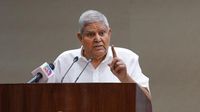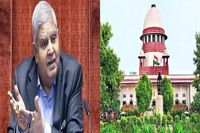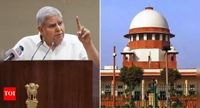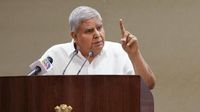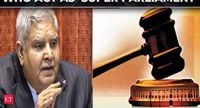On Thursday, April 17, 2025, Vice President Jagdeep Dhankhar voiced significant concerns regarding a recent Supreme Court ruling that imposed a timeline for the President of India to decide on bills forwarded by governors. This directive, he argued, undermines the constitutional role of the presidency and raises questions about the separation of powers within the Indian democracy.
During a speech to the sixth batch of Rajya Sabha interns at the Vice-President’s Enclave, Dhankhar criticized the Supreme Court's April 8 judgment, which mandated that the President must act on bills reserved by governors within three months. He emphasized that such a ruling could lead to a scenario where the President must either grant or deny assent in a time-bound manner, or else the bill automatically becomes law.
“We never bargained for democracy for this day,” Dhankhar stated, expressing alarm at what he sees as judicial overreach. He questioned the legitimacy of the court's authority to direct the President, asking, “Where are we heading? What is happening in the country?” His remarks reflect a broader concern that the judiciary is encroaching upon the functions of the executive and legislative branches, effectively acting as a "super Parliament".
Dhankhar’s critique is particularly relevant in light of the constitutional provisions that delineate the roles of different branches of government. He pointed out that while the judiciary has the power to interpret laws under Article 145(3), it does not have the authority to issue directives to the President. “The only right you have under the Constitution is to interpret the Constitution under Article 145(3). There it has to be five judges or more,” he explained.
The Supreme Court's ruling was prompted by a constitutional standoff in Tamil Nadu, where Governor RN Ravi had withheld assent to several bills for extended periods. The court, in its decision, clarified that any delay beyond the stipulated three-month period must be justified and urged state governments to cooperate with the Centre regarding such matters.
In his remarks, Dhankhar also touched upon the recent discovery of cash at the residence of former Delhi High Court Judge Yashwant Verma, suggesting that the public deserves transparency on such issues. “Let the worms and skeletons be in public domain so that cleansing takes place,” he asserted, highlighting the need for accountability in the judiciary.
Dhankhar's comments come amid increasing scrutiny of the judiciary's role in governance. He cautioned against the potential erosion of democratic principles, stating, “If governance starts flowing from the judiciary, who do we hold accountable? Whom do we question during elections?” This statement underscores the Vice President's belief in maintaining clear boundaries between the three pillars of democracy: the legislature, the executive, and the judiciary.
He further criticized what he termed as the judiciary's use of Article 142, which allows the Supreme Court to issue orders to ensure “complete justice.” Dhankhar likened this power to a "nuclear missile" that could be used against democratic institutions. “What is happening in the country? A directive to the president? This is a situation I never imagined I would witness,” he remarked.
In his address, Dhankhar reiterated the importance of the President's unique role within the constitutional framework, emphasizing that the President takes an oath to “preserve, protect, and defend” the Constitution, unlike other public officials who merely pledge to abide by it. This distinction, he argued, is crucial for maintaining the integrity of the office and the democratic process.
As the debate over the judiciary's role in legislative processes continues, Dhankhar's comments highlight a growing concern among political leaders regarding the balance of power in India's democracy. His call for a return to the foundational principles of separation of powers resonates with many who fear that judicial overreach could threaten the very fabric of the nation's governance.
In conclusion, Vice President Jagdeep Dhankhar's critique of the Supreme Court's recent ruling reflects a significant concern over the boundaries of judicial authority. As India navigates these complex issues, the dialogue surrounding the roles of the judiciary, the executive, and the legislature will undoubtedly continue to evolve.
